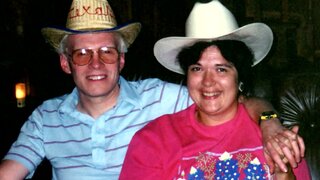Create a free profile to get unlimited access to exclusive videos, breaking news, sweepstakes, and more!
An Ohio Mom Is Found Dead From Carbon Monoxide. Was It A Tragic Accident Or Murder?
When Kathy Wangler was found dead in an upstairs bedroom of her family's Ohio home, her husband blamed the home's faulty water heater. But was there a more sinister explanation?
It’s clear what killed Kathy Wangler.
The mother of two was found dead from carbon monoxide poisoning in an upstairs bedroom of her Lima, Ohio home on Sept. 4, 2006.
But investigators were puzzled about how the 48-year-old was poisoned.
Was it a tragic accident set off by a faulty water heater inside the home as some believed? Or was it a much more calculated plan by her anesthesiologist husband, Mark, who had made his career by being an expert in gasses?
It was a question that would divide a family and take years to unravel, according to “Dateline: Secrets Uncovered.”
Mark and Kathy Wangler started dating in the small town of Fort Recovery, Ohio when she was just 15 years old. Mark, three years her senior, swept the teen off her feet by serenading her outside her home with a guitar.
The loud and bubbly Kathy complemented Mark’s more quiet personality, and the pair got married a few years later in 1977 when Kathy was 18 years old and Mark was 21 years old. While Mark went to medical school, Kathy worked to support the young family. The couple eventually had two sons, Aaron and Nathan, and moved to Lima, Ohio in 1990.
“It was a good marriage,” Mark told "Dateline" correspondent Kate Snow.
Son Aaron remembers growing up in a home filled with love.
“We were the family that you would give hugs and kisses every morning and every night before you go to bed and when you leave for school or even if you were just going out to hang out with your friends,” he said. “We were always, like, a very close family.”
But as the decades wore on, problems in the union began to surface. Kathy confided in her family that Mark had an affair, creating a permanent divide between the couple.
“She could never, ever forgive him for that,” her brother said.
They also described Mark as being critical of Kathy’s weight, her housekeeping skills, and her money habits.
Her sister Diana remembered one incident after a family photo was taken where Kathy had stormed off in anger.
“She got in the car, the boys got in the car, Mark was hanging on the side of the car and Kathy was driving away, yelling at him,” she told Snow. “And at one point, one of the boys jumped out and there was a lot of yelling and carrying on and Kathy left with the boys.”
Mark admitted the marriage was struggling after their boys left for college and said Kathy had seemed depressed and had lost her “purpose in life.”
According to Mark, the couple had been in counseling to try to save the marriage at the time of her death.
When Kathy was found dead in the upstairs bedroom of the family’s home, Mark told investigators he believed a faulty water heater was to blame.
“Dr. Wangler made a comment that they were having problems with this water heater in the past few weeks,” former Allen County Sheriff Sam Crish said. “The flame would go out occasionally and he felt that was the problem due to the carbon monoxide detectors going off.”
Mark said he had been sleeping in a downstairs bedroom when he woke up to the sound of a carbon monoxide detector going off and ran to check on his wife, who had suffered from epilepsy since she was a child.
“My carbon monoxide detector is going off and — and my wife is having a seizure,” he said in a 911 call.
But prosecutors weren’t so sure. Allen county prosecutor Juergen Waldick told “Dateline: Secrets Uncovered” investigators were unable to find any sign of a carbon monoxide leak and noted that all the appliances, including the water heater, appeared to be working properly.
“We walked around the house. We looked at the water heater. We looked at the other appliances, the gas furnace, the gas logs, the garage and also the bedroom where Kathleen Wangler died,” he said. “We just couldn’t find a source.”
Mark had also reported that on the night that Kathy died, he had been sleeping in the downstairs bedroom with the door closed, a towel underneath the door, the bathroom window open and a fan blowing because the toilet in the master bathroom had overflowed and he was trying to confine the smell.
Kathy’s family believed he knew there was carbon monoxide in the home that night and had been trying to protect himself.
Despite his claims on the 911 call that he had found his wife having a seizure, emergency responders also reported Kathy feeling cold to the touch, suggesting she had actually been dead for hours.
After serving a search warrant at the home, seven months after Kathy’s death, investigators found handwritten journals by Mark that authorities believed showed a man at the end of his rope, trapped in an unhappy marriage.
“I am tired of her lies and hiding [a] huge amount of money from me,” he wrote in one.
In another, just two months before Kathy’s death, he wrote, “Thoughts of suicide are a little strong again. Satan is attacking in a new way this time, using car exhaust.”
“That’s a real red flag,” Waldick said. “It tells you the state of someone’s marriage, at least in our assessment. If your marriage is so bad that you’re willing to kill yourself, what other things are you willing to do?”
Detectives believed that Mark had funneled exhaust from the cars, a snow blower, or a generator found in the garage of the home through the heating system into the upstairs bedroom where Kathy was sleeping.
A second search warrant served at the home would uncover what investigators thought was soot marks from fumes above a heating vent in the upstairs bedroom. They also took heating ducts, registers, and carpet samples from the home to try to determine whether soot from an internal combustion engine could be found inside the heating ducts.
While investigators were working the case, Mark had moved on and got married 14 months after Kathy’s death to an old friend he had reconnected with who shared his same devout faith in God.
The couple had been enjoying their new life together and had just returned from a mission trip in Zambia when they learned that a warrant had been issued for his arrest.
Mark’s defense team argued during the 2011 trial that the water heater had been the real culprit that night, presenting evidence from an environmental toxicologist who testified that was the most likely source of the carbon monoxide.
He pointed out numerous code violations on the couple’s water heater, including that system had been closed up in a sealed cabinet, the vent cap had been the wrong kind, and the venting on the roof had been incorrectly installed.
His attorneys dismissed testimony from lab chemists who testified that they had found soot in the heating ducts as “junk science” and presented him as a devoted Christian who would never commit murder.
The couple’s two sons, who were estranged from Kathy’s family after their vocal accusations against Mark, also testified in support of their dad.
But it wasn’t enough to convince a jury. Mark was convicted of aggravated murder and sentenced to life in prison. He will be eligible for parole after serving 25 years behind bars.



































